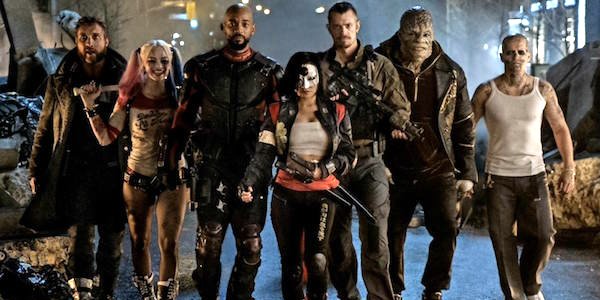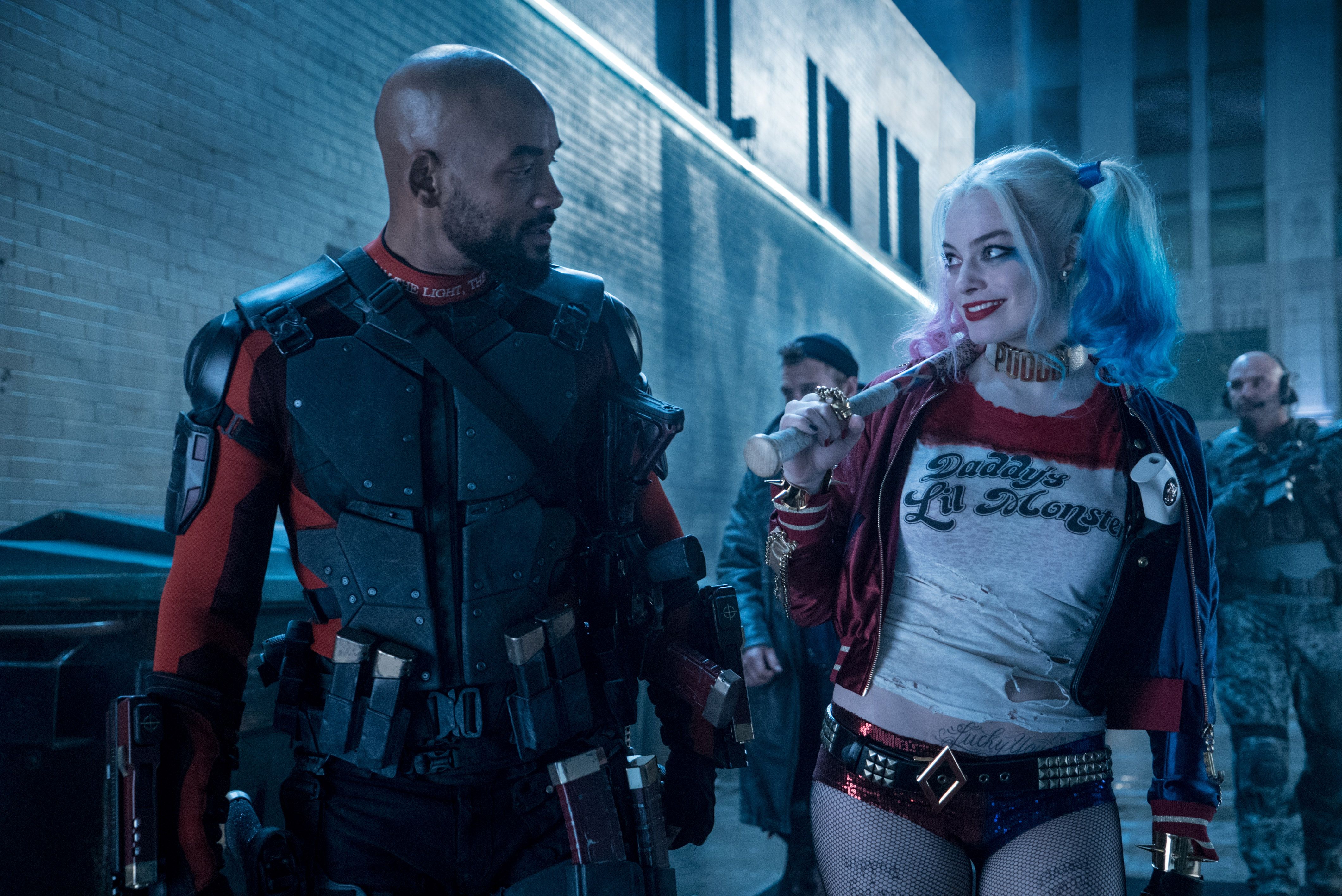There’s a compelling nugget of an idea buried within the
loud, CGI laden superhero stew that is “Suicide Squad.” That is: a “Dirty
Dozen”-esque action/buddy film with imprisoned DC supervillains.
The idea of a group of vulgar, crazy, self-motivated, ice-cold
killing criminals coming together for the purposes of good is intriguing and
different enough to work in this current superhero film climate. Warner Brothers
found the right writer/director in David Ayer (“Training Day,” “Fury” “Sabotage”
and “End of Watch”) who has a proven track record for writing compelling tough
guy characters on both sides of the law and writing funny, authentic tough guy
banter for them to hurl at each other. With “Suicide Squad” Ayer is given a
potentially strong cast of villains to do his thing.
Our squad members include: the hit man Deadshot (a cocky,
loose Will Smith that we haven’t seen in a while), the demented Harely Quinn
(Margo Robbie, flirty, giggly, gleefully lethal), an Australian thief named
Boomerang (Jai Courtney, who is surprisingly effective), a buff reptilian
fellow called Killer Croc (Adewale Akinnuoye-Agbaje) and a Latino gangster version
of the Human Torch, Diablo (Jay Hernandez).
In addition, the great Viola Davis plays the ice-cold government organizer
of the squad and Joel Kinnaman plays a Spec Ops bro. Oh, and The Joker (Jared
Leto) shows up sometimes.*
The picture is at its best when Ayer lets the squad shoot
the shit together. If “Batman v Superman” was overwhelmingly gloomy and serious,
“Suicide Squad” is more loose and playful because the characters (and the
actors) look like they’re having fun. They’re have a good time being bad guys
and being in the presence of other bad guys, trading jokes and insults. Unlike
Superman, they don’t have to worry about etiquette or maintaining a public
image. In fact they don’t give a damn what you think of them. Because of the
PG-13 rating, the film isn’t quite as edgy or brash as it should be but the
cast members still make their character’s malevolence and impoliteness
apparent.
Unfortunately “Suicide Squad,” like a number of studio
manufactured superhero movies, succumbs to certain nagging genre tropes and
undercooked plot points that dilute the authentic stuff, namely, a
one-dimensional antagonist with poorly defined abilities and motives. She is The
Enchantress (Cara
Delevingne), a witch from another dimension. It would be too lengthy and
convoluted to explain exactly how she becomes a threat (in the movie it’s
sloppily established) so lets just say she wants to destroy the world. How?
Using a big beam of blue energy that shoots into the sky causing destruction
somehow I don’t quite know how it works.
All I know is that the “big-beam-of-energy-shooting–into-the-sky”
cliché needs to go away. It’s a lazy, poorly established excuse for spectacle
and CGI. This trope is part of the larger issue with “Suicide Squad:” it turns
into yet another generic, predictable superhero spectacle with the group saving
the day and stopping bigger supervillains. And in its attempt to be so epic and
monumental (through the blurry, chaotically photographed action scenes and
blaring orchestral score) it undercuts the tightknit, playful dynamic of its
core characters. In other words, the film becomes dictated more by plot and
spectacle than character.
It also doesn’t help that the beginning is bogged down in
exposition and set up. There are a lot of characters to introduce and the
picture does it in the blandest way possible. Using a top-secret government
binder, Davis’ character quickly reads each of the characters names and
attributes, which is followed by brief flashbacks. Riveting stuff, I know. There
are simply too many characters for me to care about any of these introductions.
I don’t need to see a Reader’s Digest version of Deadshot’s backstory, or
Quinn’s. I don’t care if Deadshot has a daughter because the relationship is
surface level.
Instead of giving us
a bulleted list of the characters and flashbacks that slow the pace down it
would have been better to just put these people together; establish their
character and personality through interaction and experience, like Ayer did in
both “Fury” and “Sabotage.” Let certain details of their backstory come out
organically through conversation and the action they’re involved with presently.
Once all the group members are set up at the beginning scarce character
development happens in the later sections (with the slight exception of
Diablo).
There are some funny one-liners and the enthusiasm and playfulness of the cast kept me from totally checking out. But for the most part, the back half of the picture is one dull, murky action scene after another--ultimately leading to a bigger, duller and murkier action sequence involving a torrential downpour of rain and that goddamn beam of blue energy.
I could go on but I think I’ll stop here. “Suicide Squad” is
better than “Batman v Superman.” It’s more fun, it’s not as bloated nor does it
feel like a commercial for upcoming DC Extended Universe movies (though it is
clearly set after the events of “Batman v Superman”).
Sadly, that’s not saying much. The “Suicide Squad” itself is
used to tell the same bland superhero tale we’ve seen before.
*Similarities to Heath Ledger are immediately apparent in
the way Leto over enunciates his words and drags out his sentences. However,
the Ledger Joker was an all out anarchist who wore a dorky purple suit while
Leto plays more of an eccentric gangster. In addition to the white makeup and
green hair, he’s tatted up, wears flashy suits and lots of gold bling, resembling
a skinny Tony Montana. I wish I had more to say about him considering all the
attention he and Leto’s method acting process got leading up to the film’s
release but he makes a minor impression here; he could be cut without
disrupting the movie. There is a romance between him and Quinn but there just
isn’t enough room for it to blossom into anything substantial.




Bomb Movie! Worth a look and evaluate ourselves: http://xmovies8.watch/
ReplyDelete